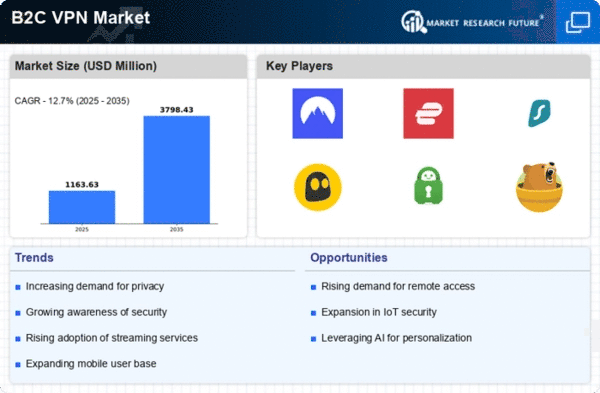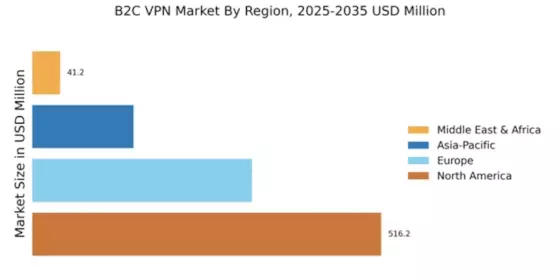North America : Market Leader in VPN Services
North America continues to lead the B2C VPN market, holding a significant share of 516.25M in 2025. The growth is driven by increasing concerns over online privacy, data breaches, and the rise of remote work. Regulatory support for data protection and privacy laws further fuels demand for VPN services, making it a critical market for both consumers and businesses. The region's advanced technological infrastructure also plays a vital role in this growth.
The competitive landscape in North America is robust, featuring key players like NordVPN, ExpressVPN, and Private Internet Access. The U.S. remains the largest market, with Canada also showing strong growth. The presence of these established brands, coupled with innovative offerings, ensures a dynamic environment. As consumers become more aware of cybersecurity threats, the demand for reliable VPN services is expected to rise, solidifying North America's position as a market leader.
Europe : Emerging Market with Regulations
Europe's B2C VPN market is projected to reach 325.0M by 2025, driven by increasing internet privacy concerns and stringent regulations like the GDPR. The demand for VPN services is further fueled by the rise in cyber threats and the need for secure online transactions. Countries in the EU are actively promoting digital privacy, which enhances the market's growth potential. The regulatory landscape encourages consumers to adopt VPNs for enhanced security and anonymity online.
Leading countries in this region include Germany, the UK, and France, where the presence of key players like CyberGhost and Surfshark is notable. The competitive landscape is characterized by a mix of local and international providers, each offering unique features to attract users. As awareness of online privacy grows, the market is expected to expand, with innovative solutions catering to diverse consumer needs. The European market is becoming increasingly competitive, with a focus on compliance and user trust.
Asia-Pacific : Rapid Growth in Digital Privacy
The Asia-Pacific B2C VPN market is set to grow to 150.0M by 2025, driven by increasing internet penetration and a growing awareness of online privacy. Countries like India, Australia, and Japan are witnessing a surge in demand for VPN services as consumers seek to protect their data from cyber threats and government surveillance. The region's diverse regulatory environment is also evolving, with some countries implementing stricter data protection laws, further driving VPN adoption.
In this competitive landscape, key players such as Hide.me and ProtonVPN are making significant inroads. The presence of both local and international VPN providers creates a dynamic market, catering to a wide range of consumer needs. As digital transformation accelerates, the demand for secure online access is expected to rise, positioning Asia-Pacific as a vital player in the global B2C VPN market. The region's growth trajectory is promising, with increasing investments in cybersecurity solutions.
Middle East and Africa : Emerging Market with Potential
The Middle East and Africa B2C VPN market is projected to reach 41.25M by 2025, driven by increasing internet usage and a growing awareness of online privacy. The region faces unique challenges, including varying regulatory environments and internet censorship, which create a demand for VPN services. As more consumers seek to bypass restrictions and protect their data, the market is poised for growth. The rise in mobile internet usage also contributes to the increasing adoption of VPNs in this region.
Leading countries include South Africa and the UAE, where the presence of VPN providers is gradually increasing. The competitive landscape is still developing, with both local and international players vying for market share. As awareness of cybersecurity issues grows, the demand for reliable VPN services is expected to rise, presenting significant opportunities for growth in the Middle East and Africa. The region's potential is becoming increasingly recognized by key players in the VPN market.

















